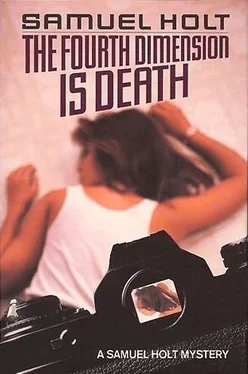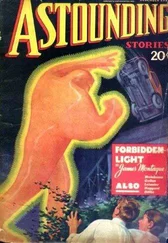The living room had been furnished with a look to utility and expense rather than style. The sofa, long and low and old and covered with a Mexican-influenced cotton spread, was the largest piece of furniture, with a couple of mismatched easy chairs and tables and lamps grouped in traditional manner around it. The television set and VCR and tape deck and trays of cassettes — mostly original cast show albums, male singers, some easy jazz — were stacked on a wooden bench facing the sofa, with the stereo system’s speakers under the bench.
And here was the cream-colored linoleum kitchen floor I had once seen in a photograph. Nothing showed now; the letters in blood had been cleaned away.
Terry Young had looked up the details of that murder, and so now I knew at least what had been done here, if not yet why nor by whom. Kim Peyser, wearing Julie Kaplan’s coat, had been stabbed, in this room, with a large kitchen knife. She had been stabbed twice, first in the back and then in the chest — the first cut not having killed her, she’d turned around to confront her murderer, who presumably had been startled not to see Julie Kaplan’s face above that coat, but who could no longer pull back from his actions — and the knife had been left in the second wound; it had snagged on a rib. The knife had come from this kitchen, had been the only large useful knife in here.
The immediate result of the stabbings was a trauma, in which Kim Peyser fell to the floor, but didn’t immediately die. So long as she was alive, her heart kept beating, and blood kept pumping from the rips in her body; that would have been for five to ten minutes. It was unlikely but dimly within the range of the possible that she could have been conscious part of that time, and used her own freshly-drawn blood to start writing my name on the linoleum floor. What had in fact happened was that the killer had turned her awkwardly — the awkwardness because of the knife hilt sticking out of the middle of her chest — and arranged the scene, with the letters and the positioning of her hand. And then he’d left.
Who was he? Why had he been here? If Julie Kaplan had been his intended victim, why hadn’t he pursued her to Florida and tried again? If Kim Peyser was the intended victim, did her death link with Dale Wormley’s at all? If she were the intended victim, why did the killing take place here? Had the killer actually come here with Kim? Had he followed, and rung the bell? Had he been here already when she arrived? Did they know each other? Did he have a key to this place? Was he the same person who killed Wormley, or not? Why had he come to this apartment?
There were so many answers I didn’t know. Packard, it seemed to me, was proving not to be such hot stuff without a scriptwriter.
I opened the refrigerator, and was surprised to find it half filled with food. Current food, that is, not spoiled old food from six weeks ago. There was a quart of low-calorie milk, half a grapefruit face down on a saucer, leafy vegetables in the crisper, a jar of diet strawberry jelly, a number of other things.
Somebody was living here. But who? Julie hadn’t loaned the place to anybody, or she would have told me so. If she’d known someone was in residence, whether through her doing or not, she would have warned me about it when she gave me these keys.
I went back out to the living room, where the signs of occupancy were subtler but finally just as clear. The TV Guide atop the television set was this week’s. A plate on an end table beside the sofa contained crumbs — cookie crumbs, I thought — that were not entirely hard; last night’s midnight snack.
Who was living in here? Was it somebody who knew the situation — one tenant dead, the other away for an extended stay in Florida — and just decided to take advantage of the empty apartment and move in? Was it a friend of Dale Wormley’s, or Julie’s, or was it a stranger?
Was it the killer?
Since none of this made the slightest sense, that last idea was no more nonsensical than any other. And while I was standing there in the living room, rolling cookie crumbs between my fingertips, thinking about the lack of sense in this affair, I heard the key grate in the lock and knew the interloper — the other interloper, actually, since I was an interloper, too — was home.
I had no desire to begin with a confrontation; I preferred first to find out who this person was and what was going on. At the entranceway, at that door about to be opened, there were three choices of movement: One could come straight ahead into the living room. One could turn left into the kitchen. Or one could turn right through a doorway and then left through another doorway into the bedroom. Striding, trying to be silent, I went into the bedroom.
And when I saw the black leather purse on the bed, large, rather shiny, with a short black strap and a big clunky chrome clasp on the top in the shape of a rose, I knew exactly who’d moved in here. Even before she got the door open — still unused to the complexity of city locks — I knew Dale Wormley’s mother had taken up residence in his abandoned nest.
She must not see me. She must not find me here. I looked around the room, knowing she would come in here first to hang her coat in the closet — if she then went into the bathroom, I’d have an opportunity to make my escape — which meant I couldn’t hide in the closet. Nor in the bathroom. Which meant, God damn it to hell, there was only one choice.
I went under the bed.
Fortunately, it was a king-size bed, so there was room to get all of me underneath it, but it was very low to the floor, so that every time I lifted my head from the carpet I hit the bottom of the box spring. I felt absurd, as though I’d wandered into a very old farce indeed, but this situation was serious and very dangerous. This woman was suing me. She had publicly accused me of killing her son. I could not be found in this apartment, wearing a disguise, hiding under the bed. It was impossible even to think about the consequences, and therefore it could not be permitted to happen.
The bed had a skirt, almost to the floor, but under its hem I could look out and see her feet as she came into the bedroom. She crossed first to the closet, as expected, to hang up her coat, but then, instead of going to the bathroom, she went back out the way she’d come in, and a minute later I heard water in the kitchen being run into a kettle.
I didn’t dare move. I could only wait, and hope, and feel like the world’s prime idiot. What if I’d stood my ground when she’d come in? What if I’d claimed to be an old friend of Julie’s, showed the keys Julie had given me? It was too late for that now, but what if I’d done it at the very beginning?
No. In the first place, I hadn’t yet realized who was living here when I made my decision to duck into the bedroom. And in the second place, with the lawsuit coming up, it was just too dangerous to actually meet the woman, in disguise, pretending to be somebody else. Whatever credibility I might have in court would vanish, if she ever recognized me.
The kettle boiled. When I heard a voice a minute later, in the living room, I thought at first she’d turned on the television set, but then I realized it must be her own voice, and that she was on the phone.
I squirmed out from under the bed. Tiptoeing, I crossed to the doorway, and leaned against the wall to listen:
“...another two or three weeks. Julie’s still in Florida, avoiding me, you know the way she is — Helen, she was never what you would call warm to me when Dale was alive, and nothing has— Well, that’s very forgiving of you. Yes, she probably does feel that way, I don’t doubt it. But I am not going to call her, because then it would look as though I was asking permission to stay in my own son’s apartment, which I am not. Those newspaper people haven’t thought to look for me here, so it’s been very restful.”
Читать дальше












